Garum: The Fermented Fish Sauce the Ancient Greeks...
Whether drizzled on lentils, stirred into...
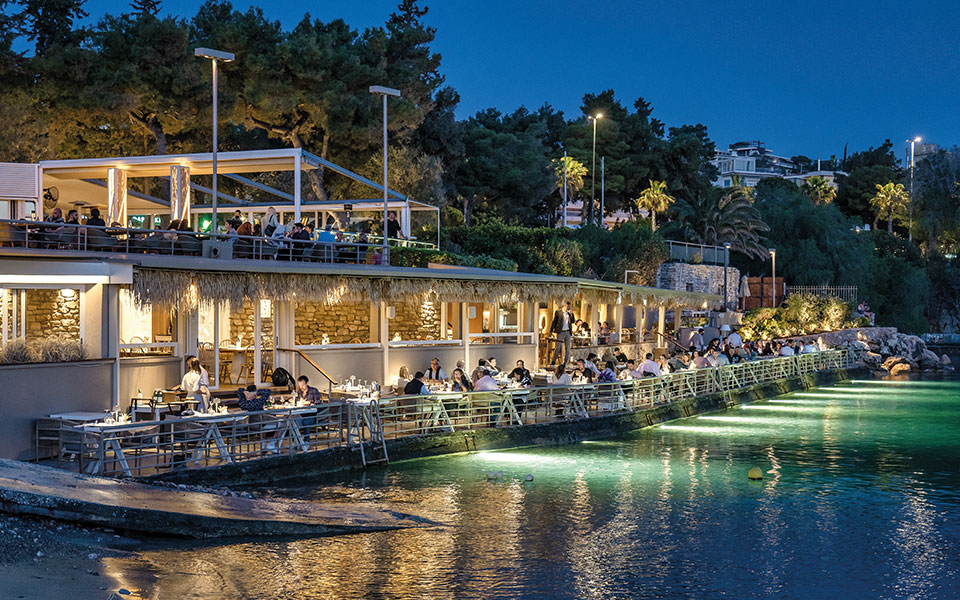
The seaside deck at Blue Fish is pure magic in the evening.
© Perikles Merakos
Athens has more than 60 kilometers of coastline and the country’s biggest port, Piraeus, at its feet, keeping it well supplied with fresh fish. These aren’t the only two reasons that you’ll get some of the best seafood here; local chefs simply love working with the stuff, and the capital boasts two fish restaurants with Michelin stars. In addition, there are dozens of restaurants that respect seasonality and prepare the sea’s bounty without too many culinary frills, not to mention dozens more tavernas with seaside views and simple Greek summer classics, such as fried calamari or grilled octopus – all washed down with a glass of ouzo. The choice is yours.
Wondering where Athenians eat? For fish and other seafood, they often head to the Athens Riviera. At Blue Fish in Vouliagmeni, the tables in the deck area are practically floating on the water. The day crowd tends to be a boisterous bunch, with groups of friends getting together for some seafood meze and a glass of ouzo or tsipouro, but as evening falls, the mood becomes more romantic. Take the time to explore the “head-to-tail” menu, designed around a zero-waste philosophy and utilizing every part of the fish: the heads go into rich broths used to make langoustine and lobster orzo “risotto,” enriched with butter and grooved sea squirt for that extra punch of iodine, or a risotto inspired by classic stuffed tomatoes.
The collar – a delicious and tender part of the fish that used to be discarded – is grilled on a robata or sautéed “a la meuniere,” in a rich, buttery sauce. The fillets are fricasséed with wild greens and an egg-lemon sauce, while the delicious tails are grilled kushiyaki-style, or baked in a tomato and basil sauce. The wine list includes several excellent selections from Santorini, a few choice Greek and international wines that pair well with fish, and several champagnes.
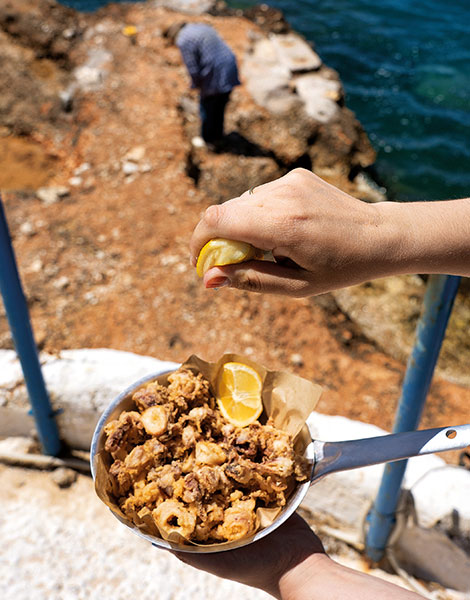
Fried calamari at Sardelaki Me Thea
© Perikles Merakos
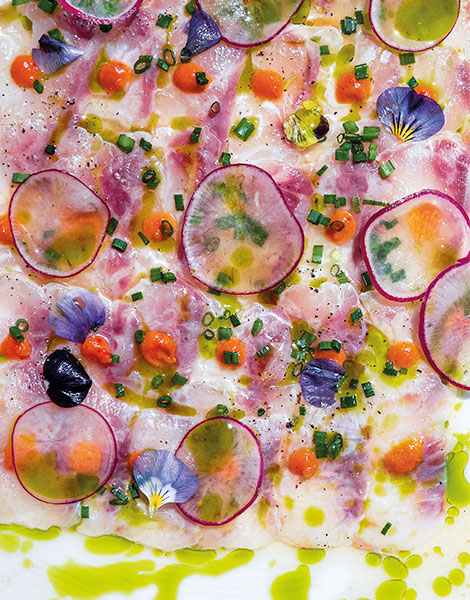
Tempting carpaccio at Blue Fish
© Perikles Merakos
Another popular seafood spot on the Athens Riviera, Sardelaki Me Thea (“Little Sardine with a View”) is renowned for its privileged location and its well-priced food – no wonder it draws the crowds from all over Athens. This taverna overlooks the site of the new Vouliagmeni Marina, which, when it’s completed, will be one of the most modern in the Mediterranean.
The menu is extensive and the food is no-frills. We recommend the small fried fish, the calamari, the grilled sardine fillets and the classic appetizers: fava split-pea paste, Greek salad, fried zucchini and octopus salad, all best accompanied by ouzo or tsipouro. If you’d like a bit more privacy, a staircase of some 20 steps will take you closer to the water and to a smaller and fancier seafood restaurant run by the same management.
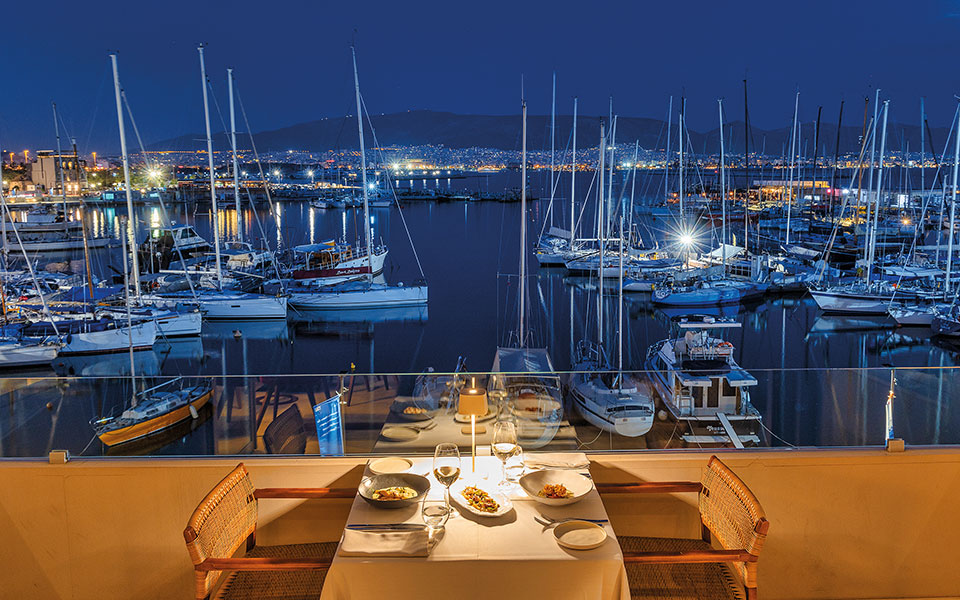
Α table for two at Varoulko Seaside
© Perikles Merakos
The first time anyone made a reservation at Varoulko was 35 years ago, even though the original version of the restaurant was so small it only had a handful of tables, and you needed a map to find it in the tiny streets of Piraeus. Since that start to a long culinary journey for celebrity chef Lefteris Lazarou – one of the first Greeks to earn a Michelin star – his restaurant, now named Varoulko Seaside, has moved to a multi-story building at the picturesque Mikrolimano harbor. Whether you book a table on the ground floor to be near the water, or on the rooftop, where you’ll have a view of the entire city beyond the sea, you’re guaranteed a wonderful ambience and extra pampering from the staff.
Lazarou is not only renowned for his inventiveness – like his celebrated langoustine moussaka – but also for turning humble, oft-overlooked fish, such as monkfish, into stars of the table. Dishes such as the squid with pesto, or the cuttlefish ink soup he created along the way, will always be signature dishes on the Varoulko Seaside menu. At present, the restaurant is serving two degustation menus, both also available with wine pairings for a more complete experience. The sommeliers know their stuff, so we would heartily recommend this option.
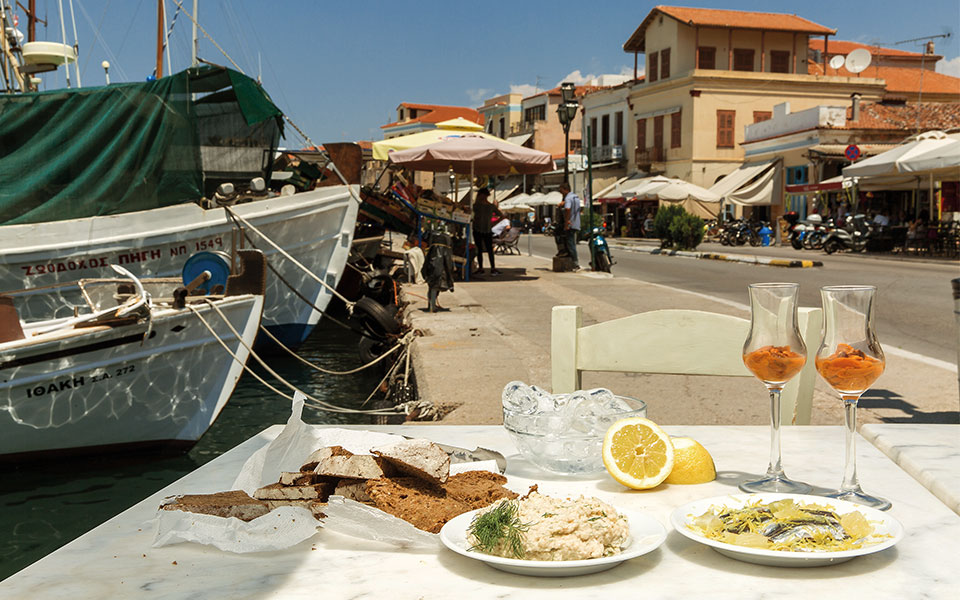
Lunch at Skotadis on the island of Aegina is a treat that's easily managed.
© Dimitris Vlaikos
The ferry from Piraeus to the island of Aegina takes about an hour. The main town is small and it’s easy to get around on foot. It’s also worth taking a swim at one of the more popular beaches: Aeginitissa, Perdika or Aghia Marina. Whatever you do, end your day here with some food at the Skotadis ouzeri, which first opened as a traditional coffee shop in 1945 at the harbor. Family-run for three generations, it became an ouzeri in the 1980s. It serves exceptional quality seafood, always in season so as to support sustainable fishing practices. Steamed mussels, pickled octopus, various pan-fried fish, as well as more creative dishes with pasta and seafood, are all worth trying here. Another must are the anchovies, cured and marinated with minimal amounts of salt and lemon; they taste of the sea.
There’s a good wine list and an excellent selection of rare distillates, some aged, accompanied by welcoming and friendly service in what many consider to be the island’s best restaurant.
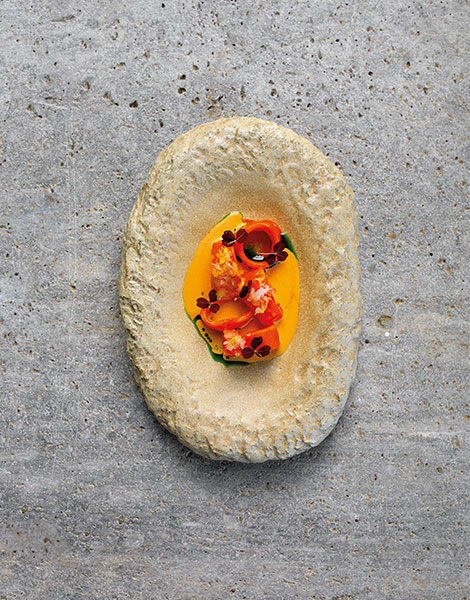
The spinialo dish at Pelagos.
© The Social Food
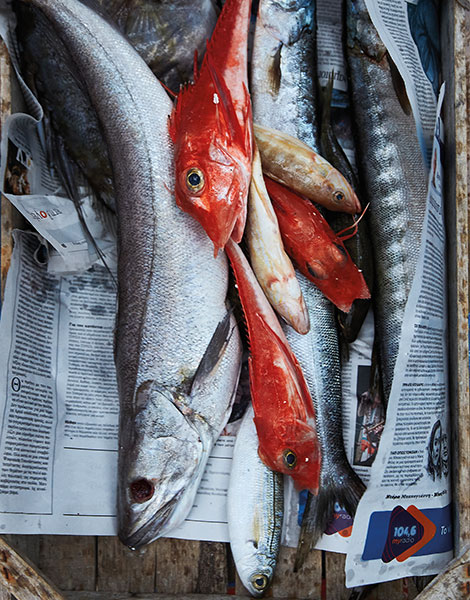
Fresh from the sea, at Skotadis Aegina.
© Dimitris Vlaikos
Kariki is a handmade cheese produced on Tinos in the Cyclades. It’s not like any other Greek cheese; its taste is reminiscent of Roquefort or Gorgonzola. A non-edible type of gourd, the dried shell of which is often used as a container for liquids, is employed in its preparation. Cheese made from cow’s milk is stored in the gourd to mature. The gourd is cut in half and the cheese is placed in its lower part; the rim of the upper part is smeared with flour paste, and the top is replaced. The cheese stays in there until it changes color, becoming anything from light orange to red, with green and blue spots here and there.
Tinian kariki is a special product made in limited quantities. The island’s artichokes aren’t available in abundance either; you can only find them for a few days a year.
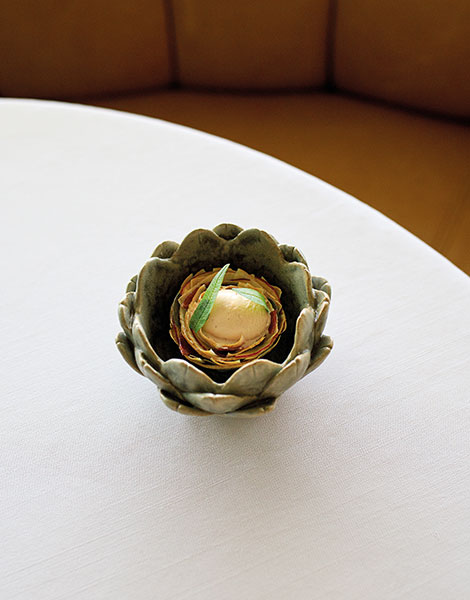
Beautiful tableware from Mud Lab.
© The Social Food
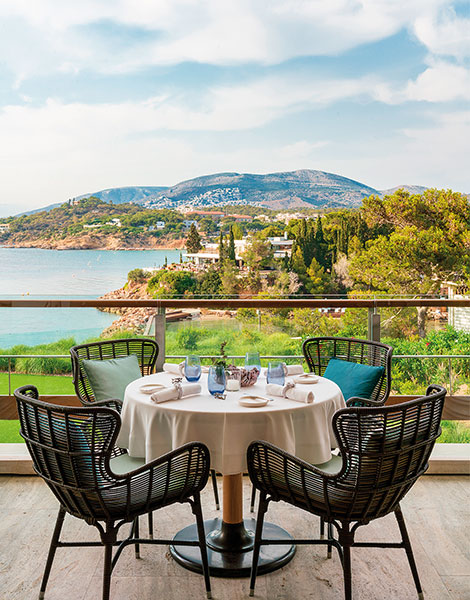
A table with a view at Pelagos, the Michelin-starred restaurant of the Four Seasons Astir Palace Hotel Athens.
© The Social Food
It was such rare ingredients that inspired the Pelagos team at the Four Seasons Astir Palace Hotel Athens in the creation of its new degustation menu. In total, nine rare foodstuffs, grown or prepared in specific microclimates with limited availability, can be found on the Pelagos on Tour menu. Chef Luca Piscazzi and the restaurant team traveled to three relatively untouristed Greek islands whose particular products make them important to chefs. From Tinos, they chose kariki, artichoke and goat meat; from Lesvos came traditional ouzo, sardines and olive oil. Kalymnos gave them octopus ink and wild swordfish, as well as spinialo – a technique for preserving seafood, mainly sea squirts, in salt water.
“For me, the most impressive part of the experience was the discovery of raw materials, so we focused on keeping the ingredients almost intact on the plate,” says the chef. Furthermore, new custom-made dinner plates have been created to match the new recipes, nine designs inspired by ingredients and made by Mud Lab in Athens.
The restaurant Pelagos won its first Michelin star within 6 months of opening. Its new menu is a trip through haute traditional cuisine, a voyage you experience without ever having to leave your table.
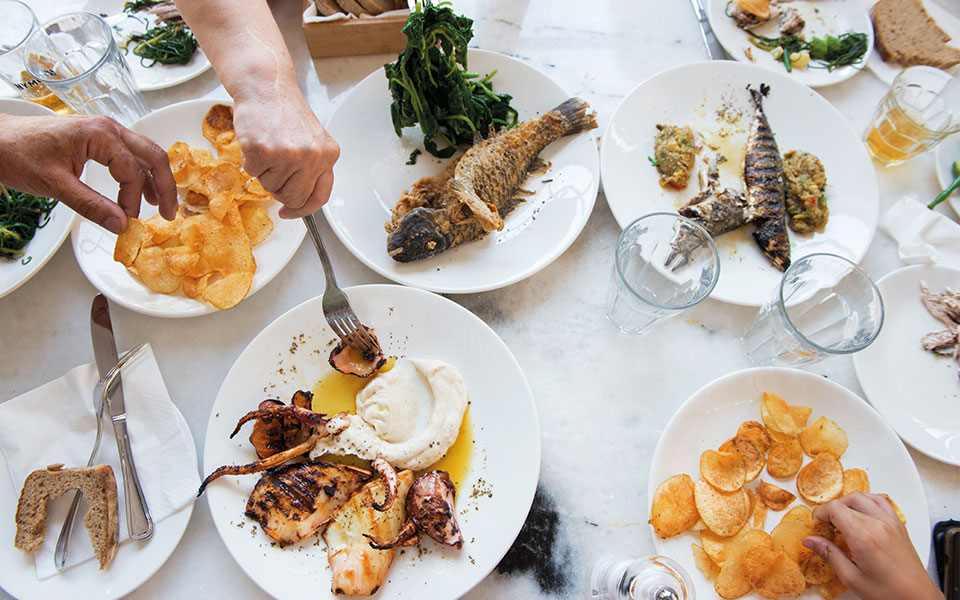
Phita serves delicious no-frills seafood
© Angelos Giotopoulos
Phita opened in 2019 in a working-class neighborhood that’s nowhere near the sea but, thanks to word-of-mouth and good food – and despite an absence of marketing – it soon became hugely popular. While it’s technically not classified as a seafood taverna, the menu weighs heavily in that direction. The chefs/owners remain true to the philosophy of sustainability and seasonality by showcasing fish that are usually regarded as second or even third-rate. In the summer, during the reproductive season for big fish, they serve only the smaller coastal species. All of their fish is fresh. Try the taramosalata (roe paste), the bonito with wild greens and Dijon mustard, the crayfish ragu ravioli or the famous handmade pasta with bottarga, which may be one of the best dishes you’ll eat in Athens.
Before the impressive Stavros Niarchos Foundation Cultural Center was built, the surrounding area, Tzitzifies, was home to a horse-racing track, several nightclubs and, because of its seaside location, several fish tavernas. A few survive to this day, tucked away among the housing built for refugees and seemingly at odds with the architectural splendor of Renzo Piano’s SNFCC. Pezoulas is one such well-hidden secret, located just a few meters from the entrance to the cultural center, on Peisistratou Street, in a modest setting evoking the classic Cycladic island tavernas. Panagiotis Pezoulas opened this establishment in 1951 as a working-class eatery that served fish stew and other staples to the entertainers from the local clubs and pundits from the racecourse. The business passed from father to son in 1975 and then to the grandson in 2021. Panagiotis Pezoulas the younger has kept some of the staples like the fried red mullet, but he’s also added several raw dishes like fish carpaccio, ceviche and sashimi to the menu.
Whether drizzled on lentils, stirred into...
The signature dish of the island...
A major restoration project is bringing...
From Michelin-starred tasting menus to sushi...